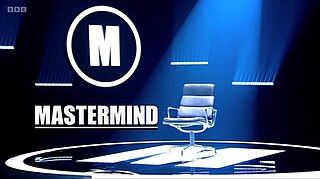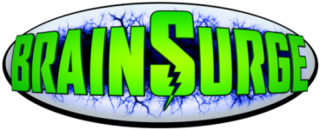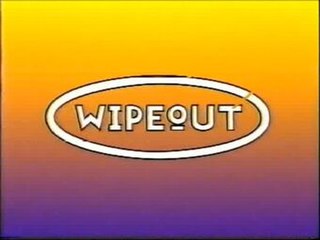Related Research Articles

The Weakest Link is a British television quiz show, mainly broadcast on BBC Two and BBC One. It was devised by Fintan Coyle and Cathy Dunning and developed for television by the BBC Entertainment Department. The game begins with a team of nine contestants, who take turns answering general knowledge questions within a time limit to create chains of nine correct answers in a row. At the end of each round, the players then vote one contestant, "the weakest link", out of the game. After two players are left, they play in a head-to-head penalty shootout format, with five questions asked to each contestant in turn, to determine the winner.

Mastermind is a British television quiz show for the BBC, currently presented by Clive Myrie. Its creator, Bill Wright, drew inspiration from his experiences of being interrogated by the Gestapo during World War II. The show features an intimidating setting and challenging questions. Four contestants face two rounds, one on a specialised subject of the contestant's choice, the other a general knowledge round.

Eye Guess is an American game show created by Bob Stewart and hosted by Bill Cullen that aired on NBC from January 3, 1966, to September 26, 1969. The game combined a general knowledge quiz with a Concentration-style memory element, in which the answers were shown to the players and their recall of their positions was tested.

Wipeout is an American game show. Contestants competed to eliminate correct answers to trivia questions from a game board without eliminating incorrect answers, known as "wipeout"s. It aired from September 12, 1988, to June 9, 1989, with Peter Tomarken as host. The series was produced by Dames-Fraser Productions, and was distributed in first-run syndication by Paramount Domestic Television.

Beat the Teacher is a British children's game show that aired on BBC1 from 24 September 1984 to 27 October 1988. It was first hosted by Howard Stableford in 1984, then hosted by Paul Jones from 1985 to 1986 and finally Bruno Brookes from 1987 to 1988.
The Joker's Wild is an American television game show that aired at different times between 1972 and 2019. Contestants answer trivia questions based on categories determined randomly by a mechanism resembling a slot machine. The show's title refers to the game's slot-machine mechanism also having jokers, which may be used to represent any category.

Chain Reaction is an American television game show created by Bob Stewart, in which players compete to form chains composed of two-word phrases.
Going for Gold is a British television game show that originally aired on BBC1 between 12 October 1987 and 9 July 1996. It was revived for Channel 5 from 13 October 2008 to 20 March 2009.
Catchword is a daytime word game show first shown on BBC1 Scotland from 17 May 1985 until 2 April 1986, hosted by Gyles Brandreth, and then network on its sister channel BBC2 from 5 January 1988 until 23 May 1995, hosted by Paul Coia.
Bob's Full House was a British television quiz show based on the game bingo. It aired on BBC1 from 1 September 1984 until 27 January 1990, and was hosted by Bob Monkhouse.
Run the Risk is a British children's game show, which ran from 26 September 1992 to 28 December 1996. It was aired as part of the Saturday morning shows Going Live! and Live & Kicking. It is presented by Peter Simon for the entire run alongside Shane Richie, John Eccleston and Bobby Davro. The games the teams had to do involved gunge and were similar to those performed on It's a Knockout. Run the Risk borrowed much from its predecessor, Double Dare, which was also hosted by Simon. The links for the show were written by John Mann and Paul Dudderidge.
Odd One Out is a British game show based on the American version entitled Knockout. It aired on BBC1 from 16 April 1982 to 19 April 1985 and was hosted by Paul Daniels. The show is based on a short-lived American game show produced by Ralph Edwards called Knockout, hosted by Arte Johnson.
Turnabout was a BBC Television daytime quiz programme that aired on BBC1 from 26 March 1990 until 7 October 1996. The programme was hosted by Rob Curling.
Playing for Time is a BBC Television daytime quiz programme that aired on BBC One from 13 November 2000 to 23 July 2001. The programme is hosted by Eamonn Holmes.
Timekeepers is a British game show that aired on BBC1 from 3 January 1995 to 2 February 1996. It was hosted by Bill Dod.
The Waiting Game was a Saturday night game show that aired on BBC One from 17 November 2001 to 15 June 2002, with Ruby Wax as host.

BrainSurge is an American children's game show that aired on Nickelodeon and was hosted by Jeff Sutphen. The show taped its first season in February 2009, and debuted on September 28, 2009. The show's format was adapted from the Japanese game show Brain Survivor. The U.S. version was created by Scott A. Stone, co-creator of Legends of the Hidden Temple, and Clay Newbill, executive producer of The Mole.

Wipeout was a British television quiz show for BBC One, based on the original American programme of the same name. First shown on 25 May 1994, it ran for nine series: the first four of which aired at primetime and were hosted by Paul Daniels; and the last five at daytime and hosted by Bob Monkhouse, with the final episode airing on 17 April 2003, 8 months before Monkhouse died on 29 December 2003.
Scream! If You Know the Answer is a British game show presented by Duncan James and narrated by Colin Murray. The games are simple general knowledge, but they are played on the rides at theme park Thorpe Park. Contestants consist of two teams of two, one member of each team being a celebrity.
Takeover Bid is a British game show that aired on BBC1 from 26 May 1990 until 15 July 1991. It was hosted by Bruce Forsyth and assisted by Claire Sutton. The basic premise of Takeover Bid was that of a "reverse game show", where the contestants were given prizes at the beginning of play, and the object of the game was to try and keep them.
References
- ↑ "Old BBC Regional Production Studios". TV Studio History. Retrieved 4 July 2021.
- ↑ "Four Square - BBC One London - 3 May 1988". BBC Genome Project . Retrieved 2 June 2015.
- 1 2 "Four Square - BBC One London - 26 May 1988". BBC Genome Project . Retrieved 2 June 2015.
- ↑ "Four Square - BBC One London - 11 September 1989". BBC Genome Project . Retrieved 2 June 2015.
- 1 2 "Four Square - BBC One London - 2 November 1989". BBC Genome Project . Retrieved 2 June 2015.
- ↑ "Four Square - BBC One London - 10 September 1990". BBC Genome Project . Retrieved 2 June 2015.
- 1 2 "Four Square - BBC One London - 31 October 1990". BBC Genome Project . Retrieved 2 June 2015.
- ↑ "Four Square - BBC One London - 9 September 1991". BBC Genome Project . Retrieved 2 June 2015.
- 1 2 "Four Square - BBC One London - 31 October 1991". BBC Genome Project . Retrieved 2 June 2015.